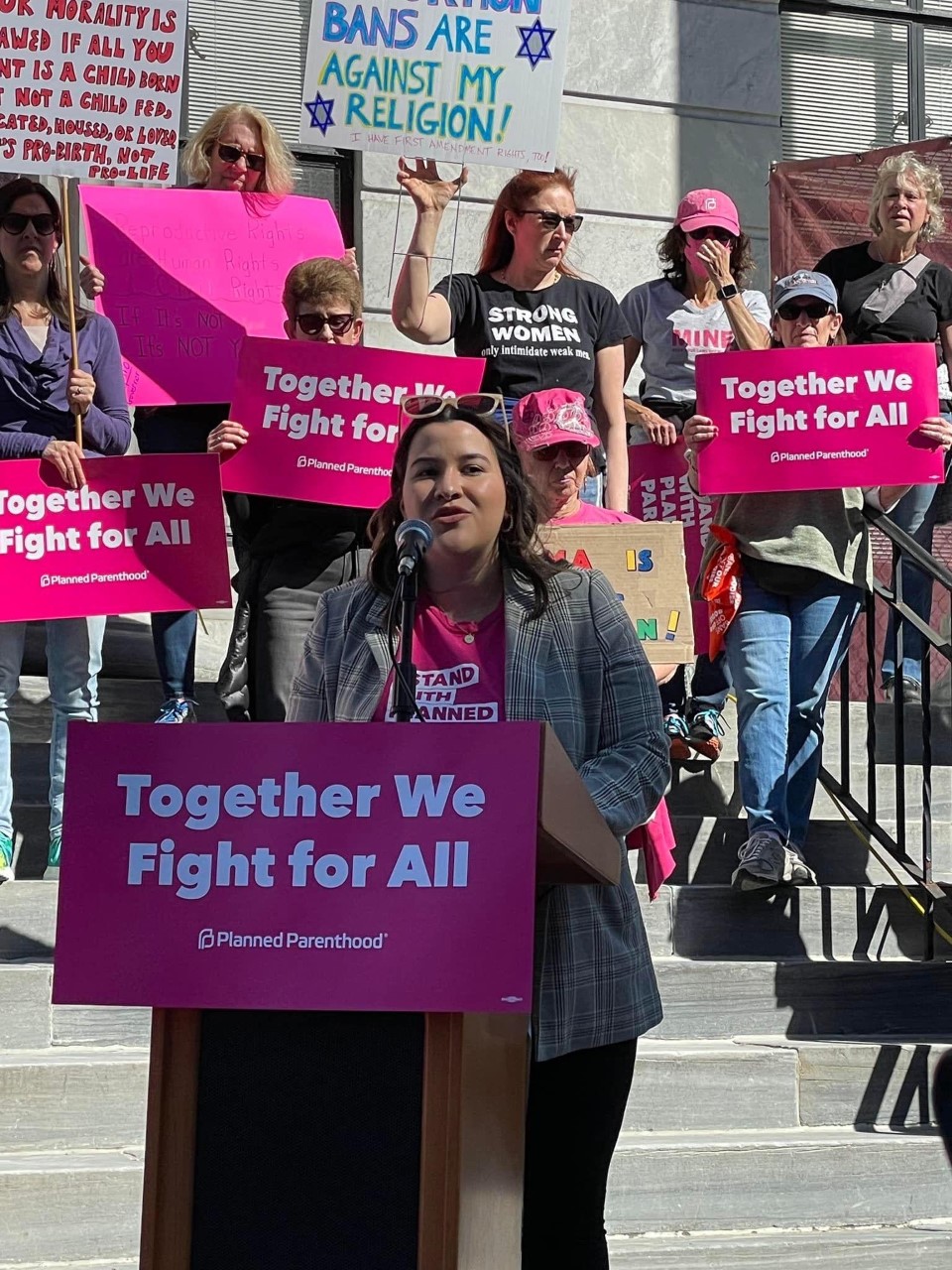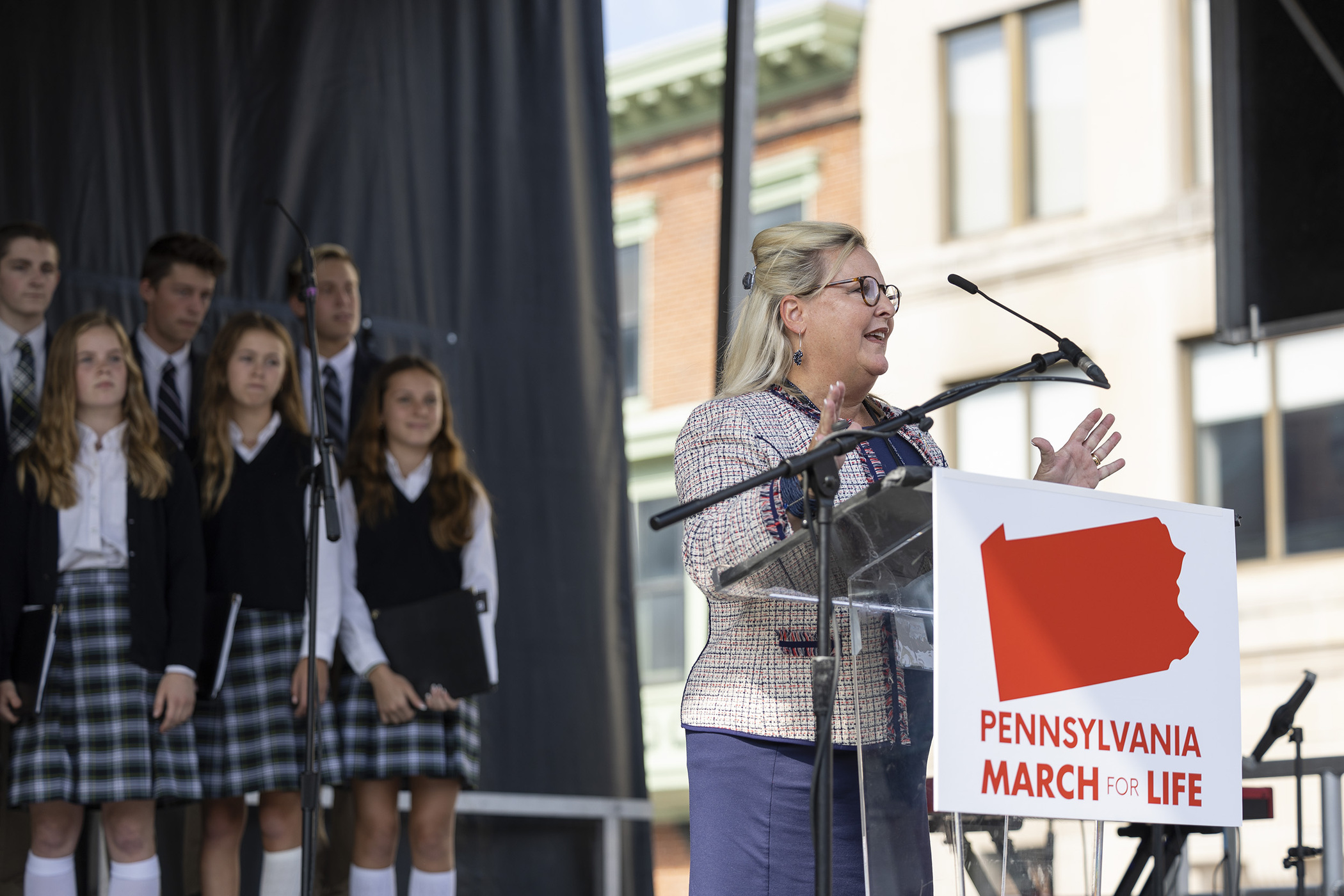Capitol Beat
The primer: Understanding how state funding for pregnancy care is going to change in 2024 – and why it matters
What the state’s decision to move away from crisis pregnancy centers means for the future of care in the commonwealth.

The Shapiro administration's decision to end a contract with Real Alternatives has set off a debate over state-funded reproductive services. NIGEL THOMPSON/AL DÍA NEWS/GETTY IMAGES
Gov. Josh Shapiro’s administration is choosing not to renew a contract with Real Alternatives, a Harrisburg-based nonprofit that partners with crisis pregnancy centers to provide alternatives to abortion. Real Alternatives has 83 locations across the commonwealth, and with the organization’s future now in question, the move has set off the latest public battle in Pennsylvania over women’s health care services and access to abortion.
The decision to let the state’s contract with Real Alternatives expire adds the latest chapter to a story still being written: what access to abortion and other reproductive health care services will look like in the wake of the U.S. Supreme Court’s 2022 ruling that ended the 50-year right to abortion enshrined in the court’s 1973 Roe v. Wade decision.
Shapiro, who campaigned on protecting the right to abortion, cast the move to let the contract expire as an immediate win. His administration has since solicited applications for new women’s health service programs.
But while Democrats and abortion rights proponents celebrated the move, it also drew plenty of pushback from critics, including GOP lawmakers and anti-abortion advocates.
What is Real Alternatives?
Real Alternatives is a nonprofit based in Harrisburg that partners with crisis pregnancy centers and has been under contract with the state for the last 27 years to provide alternatives to abortion for pregnant women.
Throughout its history, the organization has also had a presence in Indiana, as well as Michigan, though the state’s Democratic governor, Gretchen Whitmer, line-item vetoed funding for Real Alternatives in 2019, according to the Women’s Law Project.
Indiana is expected to continue funding the organization, despite some state lawmakers raising questions about The Hoosier State’s own funding of a similar program last year, according to reporting from the Indiana Capital Chronicle.

According to the Shapiro administration, the commonwealth first began providing state funding to Real Alternatives in 1995, during then-Gov. Robert Casey Sr.’s administration. The most recent state allocation, approved last year, was for $7.2 million, according to the Pennsylvania Treasury’s contract database.
In addition to state funds, part of the organization’s funding also comes from federal Temporary Assistance to Needy Families (TANF) grants, which has become a point of contention among those who oppose the organization and crisis pregnancy centers.
In a July 2022 interview on Fox & Friends, Real Alternatives President and CEO Kevin Bagatta walked through the genesis and mission of Real Alternatives, which at least up until now, administered the state’s Pregnancy and Parenting Support program. “The National Right To Life affiliate and the Catholic Conference asked Gov. Casey to put funding so pregnancy centers, adoption agencies, maternity homes and Catholic Charities could serve more women so they didn't need to choose abortion – and that's what our mandate is.”
During an appearance at an October 2022 symposium on pregnancy support services in Pennsylvania, Bagatta said that under the organization’s contract, they are “not to promote, refer or counsel for an abortion.”
According to Real Alternatives’ website, the organization provides a mix of counseling and mentoring services, pregnancy tests, clothing, food, furniture, shelter and classes on pregnancy, childbirth and parenting, as well as abstinence education and information about adoptions.
Real Alternatives does not provide medical services to those seeking assistance, but its counselors do refer people for medical care, according to the organization. Real Alternatives says it has provided services to nearly 350,000 people during 1.9 million office visits. Roughly 13,500 women a year use the organization’s support services.
Why is the Shapiro administration not renewing the contract?
On Aug. 3, the Shapiro administration announced that it will let the state’s contract with Real Alternatives expire on Dec. 31, 2023. The administration sent out a Request for Applications seeking women's health care providers on Aug. 18.
Shapiro framed the decision as a continuation of his support for women’s right to choose their own health care. “For decades, taxpayer dollars have gone to fund Real Alternatives. My administration will not continue that pattern – we will ensure women in this commonwealth receive the reproductive health care they deserve,” he said in a statement announcing the decision. “Pennsylvanians made clear by electing me as governor that they support a woman’s freedom to choose, and I will be steadfast in defending that right.”

The request for applications published by the administration says that the Department of Human Services is “seeking to secure a grantee to oversee and administer a regional program providing a comprehensive array of essential services that cater directly to the distinctive requirements of women, pregnant women, and new mothers.” Comprehensive services does not include abortion, according to the RFA.
Signe Espinoza, the executive director of Planned Parenthood Pennsylvania Advocates, welcomed the decision and said she hopes the application process will allow the state to partner with an organization that provides a wider breadth of services.
“A solution here would be to ensure that we're meeting the true gaps,” Espinoza said. “When we're talking about the fact that we are in an STI crisis, we are in a maternal health crisis, I think that what we would like to see is our state really open up applications to ensure that real providers or real organizations who provide critical services during this crisis have that opportunity.”
According to the RFA, the department is seeking to provide prenatal education programs, antenatal care supports, access to menstrual health hygiene products, testing for sexually transmitted infections and postpartum health supports – among other goals – under the new program.
What critics of the move are saying
The decision to move away from Real Alternatives has frustrated GOP officials in the General Assembly, including Senate President Pro Tempore Kim Ward and state Sens. Kristin Phillips-Hill and Judy Ward, the latter of whom hosted a symposium focusing on pregnancy support services last October.
Kim Ward, the Senate’s top-ranking Republican, said she will be monitoring the RFA process to ensure that it doesn’t exclude Real Alternatives or similar organizations.
“There is no victory in denying women across Pennsylvania comprehensive health services including parental support and adoption services,” she said in a statement. “It is important to ensure that these valuable services continue, and we will be monitoring the Department of Health’s Request for Application process to ensure that the qualifications to apply are not narrowly written in an effort to exclude organizations such as Real Alternatives or organizations with similar missions from applying.”

Lexi Sneller, a policy and communications officer with Pennsylvania Family Institute, a conservative advocacy organization, said Real Alternatives’ network of facilities and support providers would be difficult to replace.
“They provide diapers, formula, clothing, strollers, cribs – everything that you could need through a pregnancy,” Sneller said. “In addition to that, they also provide counseling and parenting classes, both for new mothers and fathers … What they do is just very irreplaceable in our communities.”
Judy Ward, who led the 2022 symposium focused on Real Alternatives and the services it provides, called the Shapiro administration’s decision “sickening” in a statement. She went on to accuse Shapiro and Department of Human Services Secretary Val Arkoosh of sacrificing “the needs and desires of so many women at the altar of their far-left social agenda.”
Real Alternatives’ public affairs team said they were shocked by the decision, and that it will ultimately lead to an increase in abortions in the state. “We believe the governor has been terribly misinformed about the need for the program and its success,” the organization said.
Sneller said the move from the Shapiro administration could do more harm than good.
"It would have a devastating impact on women and families in Pennsylvania. There would be millions of dollars of resources lost that these pregnancy resource centers would need to make up through community support,” Sneller said. “When we remove support and funding from this vital part of our communities, the people who are going to get hurt are the people who need help the most.”
Why abortion rights advocates support the move
Speaking of misinformation, critics of Real Alternatives – including Democratic lawmakers and abortion rights advocates – allege that the organization has long been misinforming the people it serves.
“They don't talk about abortion. They don't refer for abortions. When we're talking about ensuring that people have unbiased sexual and reproductive health care, and when we're talking about the full range of sexuality and reproductive health care in America, we know that that includes abortion,” Espinoza said.
And while leaders at Real Alternatives have stated publicly that the organization doesn't provide medical services, Espinoza and others said Real Alternatives can give off the sense that it provides medical services. “The way they like to lure people in and make it seem like they're medical facilities when they're not is harmful.”
Espinoza said Real Alternatives frequently portrays abortion in ways that are medically inaccurate, adding that crisis pregnancy centers have promoted unproven abortion pill reversal tactics that have been disputed by the American College of Obstetricians and Gynecologists.
Democratic state lawmakers echoed those concerns. Members of the Pennsylvania Women’s Health Caucus said in a statement that crisis pregnancy centers “are known for pretending to provide health care services to pregnant women when, in reality, they have a singular goal of dissuading women from receiving abortions and have long track records of giving their clients dubious advice from non-medical professionals.”
State Sen. Amanda Cappelletti, who co-chairs the Pennsylvania Women’s Health Caucus, told City & State that moving away from the Real Alternatives contract will allow the state to develop a program without a political or ideological bent.
“What this means is that Pennsylvania families, and those that are looking to start families, will now have access to evidence-based care to real leadership in these spaces, without any regard for a political doctrine or any kind of religious agenda,” Cappelletti said.
For those who have long been advocating for the state to break off its relationship with Real Alternatives and crisis pregnancy centers, the Shapiro administration’s decision resembles progress – but not the end of the fight.
“We're celebrating this win, but we’re back at it tomorrow,” Espinoza said. “Crisis pregnancy centers outnumber abortion providers 9-to-1, so we know that our work is far from over, but we are certainly counting down the days to Dec. 31 when this contract ends.”
Cappelletti concurred. With the state now soliciting applications for a new state program, she hopes that any new program providing pregnancy-related services will be more transparent and more well-rounded – and underscore what Democrats can do with their new power dynamic in Harrisburg.
“We are working to demonstrate to people that Democratic leadership means that we will have access to the medical care that we need and deserve, without judgment and without fail, and that we are going to be putting taxpayer dollars into programs that have demonstrable results,” she said.
This story has been updated to include additional information about the Request for Applications.
